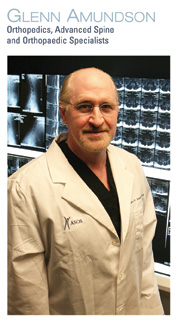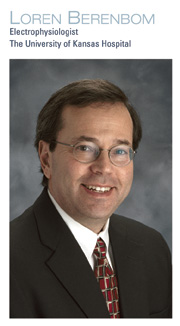
It takes a certain amount of backbone to be a physician, but Glenn Amundson takes that trait to a whole new level: “I’ve been trained, taught, researched, treated and operated on Spine for 25 years,” he says, all but personifying his field of expertise. “I eat and sleep Spine.”
He’s an orthopedic surgeon at Advanced Spine and Orthopaedic Specialists, firmly rooted in Kansas City after a career that started in the Navy following graduation from Annapolis in 1975. He took a position in orthopedics at the University of Kansas Medical Center and became chief of the adult orthopedic spine service before leaving in 2000, and he holds more than 20 medical certifications.
His life would be consumed by the fascination he holds for his work but for just a few distractions—the challenges of practice in today’s medical climate, he says. Then he bats out the laundry list: “Increasing oversight and regulation, increasing documentation, conversion to electronic medical records [every system is different], decreasing reimbursement for years, more patient denials of care from insurance companies, increasing
costs to practice, malpractice insurance costs and issues, insurance companies acting as the ‘gatekeepers of care’”—it goes on and on, Amundson says.
His hours, divided between clinic and operating rooms at Shawnee Mission Medical Center and Heartland Surgical Specialty Hospital, compel him to take his research, instrument-development work and administrative tasks with him on weekends. But he still tries to find time to get the family to their floating touchstone at the Lake of the Ozarks, where reconnecting and watching the kids on the Wave Runners help him recharge for the coming week. And that helps him keep his focus on his patients. “Everything I do—training, reading, research, time spent—is dedicated to my patients,” Amundson says. “I try to treat every patient like I or my family would want to be treated.”
A career in medicine, he says, is “the single best decision I have made in my life.”

It was more than just a homecoming when Loren Berenbom returned to the grounds of The University of Kansas Hospital in 2000. “My father came to KU in the early 1950s to do cancer research,” said Berenbom, who in fact drew his first breath at the hospital—he was born there. Since his return, he has helped breathe new life into the hospital’s cardiology programs as director of the Richard & Annette Bloch Heart Rhythm Center.
Widely recognized for his work in electrophysiology, a subspecialty of cardiology, Berenbom is credited with helping the hospital’s heart program achieve national prominence; it’s been recognized as one of the nation’s best by U.S. News and World Report for five years in a row. His fascination with the impulses that control the heart has contributed to ground-breaking work in the fields of implantable defib-rillators and techniques to remove pacemaker and defibrillator leads.
Early in his study of cardiology, he had an encounter that would forever frame for him the importance of a physician’s role in healing. He was treating a woman with heart failure—diabetic, overweight and with poor kidney function. “She had been in and out of hospitals for 20 years and knew more about how they worked and how our health-care system worked than just about anybody I ever met,” Berenbom recalls. “She taught me what it means to a patient, to have a physician they can trust. She taught me to be a better physician and a better person.” Before his training ended, he was providing care for nearly 10 of her relatives, and he still gets updates on the family through connections back in St. Louis.
Nearly three decades into his career, Berenbom says he recently came across a nugget of medical wisdom that crystallizes his approach to care-giving. “‘Patients don’t care how much you know until they know how much you care.’ I really do care about my patients. I’m a good problem-solver. I can think outside the box and come up with ways to address patient’s problems that suit their individual needs.”